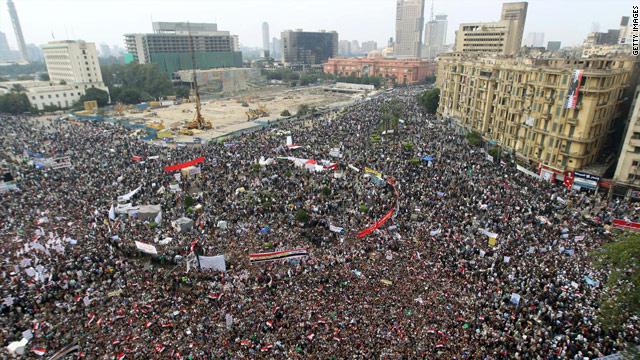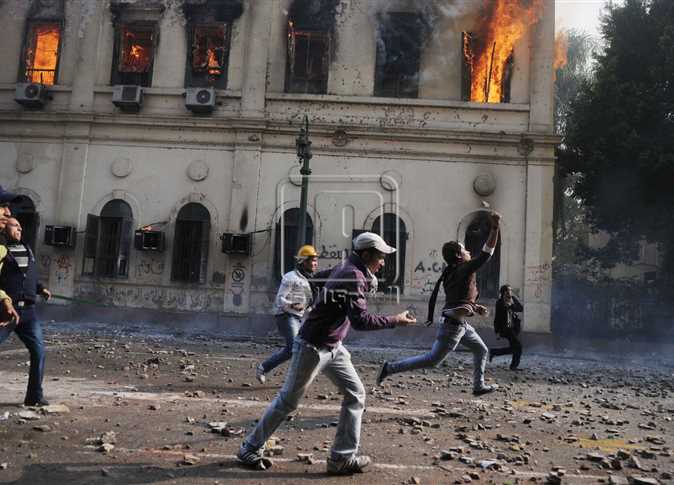Gamal Mubarak, the head of the ruling National Democratic Party’s policy secretariat spoke in the second online youth gathering yesterday, discussing education, the economy and unemployment.
Alongside Mubarak, Minister of Trade and Industry Rachid Mohammed Rachid was also featured in the forum that was moderated by media host Lamis el-Hadidi, who ran media operations for President Hosni Mubarak’s 2005 campaign for re-election. During the forum, questions and comments were received from the live audience, a group of small and medium entrepreneurs, and also through the Internet.
Mubarak’s first appearance through the newly established Sharek online interactive forum took place on 12 August, when he spoke about education issues, unemployment, corruption and living conditions. At the opening of the session, Mubarak introduced the initiative’s interest in a constructive dialogue that entails both listening and talking.
Sharek, which means "participate" in Arabic, has been widely interpreted as a party-engineered attempt to use online social networks for political purposes, based on the premise that they offer major potential for political mobilization.
Besides being a novel platform for the NDP, Sharek also runs a Facebook page that has approximately 8000 fans. In the lead-up to yesterday’s forum, paid advertisement for the event could be seen on Facebook pages, blogs and other websites, generated automatically by Google Ads. Sharek also runs a Flickr account, a photo-sharing network where stills of both meetings were posted. The NDP itself runs a Facebook page that has about 3000 fans, as well as a YouTube channel and a Flickr account.
According to some NDP figures, the online social networks are necessary to respond to mounting criticism coming from those very same networks. “Our use of the Internet comes in the wake of free and diverse media. A media that has no limits in criticizing the regime and transforming its achievements into failures,” says Mohamed Heiba, secretary of the Republic’s Youth, a central NDP committee that covers sub-committees around Egypt. “Our forums present free discussions with no red lines.”
Tawfiq Tarek, a member of the NDP and a credit officer in a bank, thinks of Sharek as a positive reaction to continuous criticism to the party from the opposition. “Youth from the opposition only criticize the NDP and the government. Through Sharek, we try to tell them to be proactive; come discuss the issues you complain about and listen to what the party has to say. It’s an open invitation based on our belief in dialogue,” he says.
“We respect the opinion of all Egyptians but we also tell them they need to listen because they don’t know everything.”
Earlier this year, the NDP organized training on the use of social media and their function in mobilization for some of its young members.
Ramy Raoof, a blogger and social network enthusiast is critical of the NDP’s hype around the new media. He observes that the party has recently become aware of the functions of Web 2.0, which are web applications that facilitate interaction and user participation, such as blogs, photo-sharing sites and social networks. “This move was quick and made all at once,” Raoof observes.
Raoof thinks that while awareness of those platforms has increased, the practice is still premature. “They still have an issue with self representation, online marketing and the use of text,” he says, noting that the party does not provide free space for participation and that content remains under its control.
None of the questions during either Sharek forum tackled the pressing succession issue. It is believed by many that Gamal Mubarak is being groomed to take-up his father’s position as president of Egypt.
Users’ comments to date on Sharek’s Facebook group are supportive of the initiative, while on Flickr, with the exception of one critical comment, the rest praised Mubarak for his call for participation. Similarly, on the website of Sharek, there are no comments opposing Mubarak and the NDP.
According to Raoof, the use of social networks must have been inspired by the most recent Iranian presidential elections where news coverage was based on Twitter, a micro-blogging network and on Barack Obama’s campaign for US president, which employed the Internet to an unprecedented extent.
“Of course they also saw how bloggers in Egypt managed to do something that reached out, much more than offline media could. They managed to influence people’s opinions,” Raoof adds.
The government-run Information and Decision Support Center said in a report last year that there are more than 160,000 blogs in Egypt. About half of those are politically oriented blogs. According to the Ministry of Communication and Information Technology, there are about 13 million people online in Egypt, which is 17 per cent of the population.
While platforms for the opposition’s online self-expression have been left open, some cyber-critics have been personally intimidated through arrest, detention, confiscation of property, and, in extreme cases, trials with verdicts of up to four years sentences.
Tomorrow Al-Masry Al-Youm English Edition will examine the NDP’s efforts to attract young people. Sharek is just the beginning.




